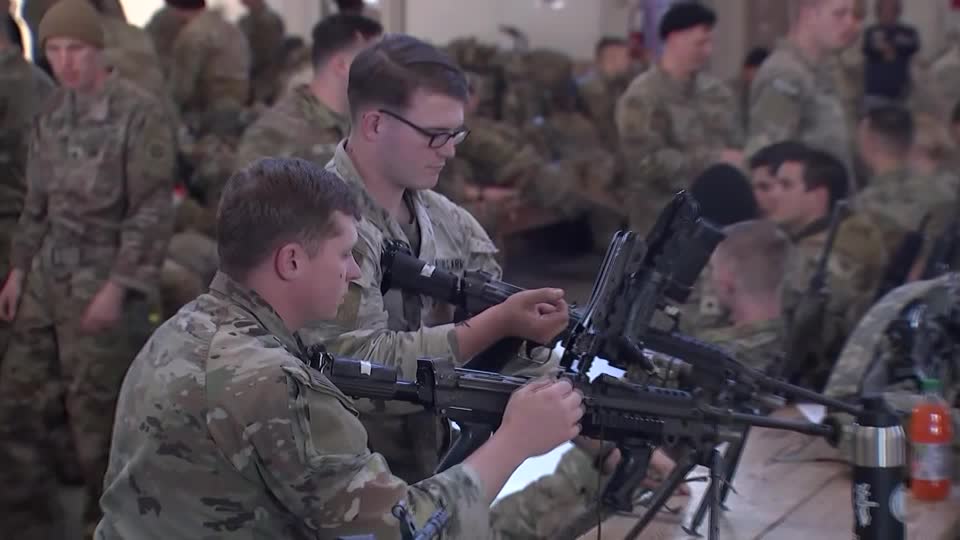
Chris Lange, FISM News
[elfsight_social_share_buttons id=”1″]
The White House has been unable to confirm Russia’s claims that some of its troops are pulling back from the Ukrainian border. In remarks made at the White House on Tuesday, President Biden said the U.S. is prepared for any eventuality but continues to seek a diplomatic resolution. Meanwhile, Russia says its next move will depend on how negotiations with the West evolve.
Russian President Vladimir Putin said on Tuesday that he welcomed continued dialogue with the West over security concerns. On the same day, his military reported that it had pulled back some of its troops near Ukraine. With no supporting evidence to back up the claims, however, the White House remains skeptical and says an invasion remains a distinct possibility.
The Russian Defense Ministry this week released images of tanks and howitzers rolling onto railway platforms and additional tanks moving over snow-covered fields, but did not disclose where or when the images were taken or where the vehicles were being moved, saying only that they were being relocated “to places of permanent deployment,” according to an AP report.
Despite Russia’s unsubstantiated overtures, Biden stressed that “analysts indicate that they remain very much in a threatening position.”
“Two paths are still open,” Biden said, referring to the West’s continued desire for a diplomatic resolution to the crisis. “But let there be no doubt: If Russia commits this breach by invading Ukraine, responsible nations around the world will not hesitate to respond,” he said. “If we do not stand for freedom where it is at risk today, we’ll surely pay a steeper price tomorrow.”
The president also disclosed that the U.S. now estimates that 150,000 Russian forces are currently positioned near Ukraine and in Belarus, marking an increase from an earlier estimate of 130,000 troops. The U.S. and NATO, meanwhile, have been deploying troops and military supplies to bolster the defenses of Eastern-European alliance members.
Russia continues to demand an agreement from NATO that Ukraine and other ex-Soviet nations will never gain admittance to its membership. The Kremlin also wants the West to halt weapons deployments near Russian borders and scale back forces in Eastern Europe. The U.S. and its allies, however, continue to reject those terms while expressing a willingness to engage in further talks with Russia to explore options to bolster security in Europe.
Following his meeting with German Chancellor Olaf Scholz on Wednesday, Putin said the West agreed to discuss banning missile deployment to Europe and place restrictions on military drills. He voiced that Russia is open to talks concerning “some of those elements” as long as they are mutually beneficial and include “the main issues that are of primary importance for us.”
Putin maintained that Russia does not want war but said that that is why it is important for his country’s security demands be met. He reiterated that Ukraine’s bid to join NATO is a serious security threat to Russia
Scholz reiterated that an eastward expansion of NATO “is not on the agenda,” adding, “everyone knows that very well.” Putin appeared to be unimpressed, saying, “They are telling us it won’t happen tomorrow. Well, when will it happen? The day after tomorrow? What does it change for us in the historic perspective? Nothing.”
During the Wednesday briefing, Biden also discussed the West’s readiness to impose economic sanctions on Russia should they invade Ukraine, including blocking Nord Stream 2, but acknowledged that such measures would also cause the U.S. economy to suffer a significant hit that could include even more fuel cost hikes and disruptions in America’s energy supply.
“The American people understand that defending democracy and liberty is never without cost,” Biden said. “I will not pretend this will be painless.”
He also said his administration is actively working on contingency plans with energy producers and shippers to address potential supply issues, adding that he will work with Congress on unspecified “additional measures to protect consumers and address the impact of prices at the pump.”
Meanwhile, Ukraine was hit with a series of cyberattacks Tuesday that disabled the Ukrainian Army’s website as well as major banks. The White House says U.S. federal agencies are prepared for similar attacks and are urging major industries to shore up their cyber security. Psaki on Wednesday said the administration does not know who is behind the attacks.
In other developments, U.S. Secretary of State Antony Blinken held a call with Russian Foreign Minister Sergey Lavrov and Biden spoke with French President Emmanuel Macron Tuesday about the ongoing crisis.
As of this reporting, there has been no indication of any attack on Ukraine, though U.S. intelligence reports said Russia was likely to invade Wednesday. Ukraine is six hours ahead of Eastern Standard time in the U.S.
